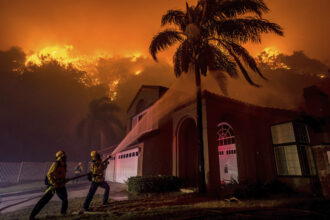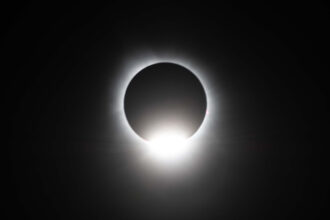In war torn Ukraine, Russia’s month-long invasion has already resulted in thousands of deaths—including more than 900 civilians—and has left some of the nation’s biggest cities in ruins. Nearly a quarter of Ukraine’s 44 million residents have been forced from their homes, with some fleeing west, away from the harshest fighting, and others leaving the country altogether.
For many of those who have fled, the war has been a story of what they were forced to leave behind: husbands who remained to fight, homes that have been passed down for generations and careers to which many have dedicated their lives.
Among them is Natalia Gozak, executive director of Ecoaction, one of Ukraine’s largest environmental nonprofits and a staunch advocate for renewable energy as a way to combat climate change.
Last year, Gozak helped organize Ukraine’s largest climate march from her office in Kyiv. Today, her life looks much different as she leaves behind the work that she has spent much of her life building. Inside Climate News spoke with Gozak, who is now living in the western Ukrainian city of Lviv, about the day she fled her home in Kyiv with her children and husband and what the war has meant for Ukraine’s once vibrant environmental community.
This interview has been edited for length and clarity.
Natalia, are you in Lviv now? Can you tell me about your situation?
Gozak: Yes, I’m in Lviv. This is the city in the west of Ukraine, and I managed to move out of Kyiv on the first day of this war. Normally, I’m based in Kyiv. There is our office, my apartment, everything.
So, you left on the first day. When did you realize you were under attack? Can you tell me about your decision to leave?
Gozak: We knew something was going on. Maybe a few months before the start of this war, we were planning what we would do as an organization and as a family. So, I had a preliminary plan and a bag packed. But still, I didn’t believe this was possible—that Kyiv was under attack.

On Thursday, the 24th of February, I woke up at 5 a.m. from the sound of explosions. This was incredible. You could imagine yourself not waking up from an alarm, but from the sound of explosions in your normal, usual life.
I woke up and I also woke up my husband. He’s a military person and he was very quick to identify that yes, these are explosions. And he first ran to fuel the car. We managed to pick up my mom from a nearby location and then maybe in half a day, we left.
And it took us a really long time. Normally, the way from Kyiv to Lviv takes maybe 7 or 8 hours to drive. It took us 24 hours. We spent the night in the middle and we used small roads because all the main roads were traffic jammed.
It was not clear at the time for how long the fighting would continue. We thought maybe a few days. So, I packed for a few days, a week maximum.
But soon it became clear. It wasn’t acceptable to live in a city under attack. It was really uncomfortable, stressful. It was like all the world turning upside down.
What about your family? Are they with you in Lviv?
Gozak: My kids and mom and cats, actually. But my husband went back the next day, back to Kyiv, to join the defense forces and defend our city. He has military experience in 2014 and 2015, but normally he’s a biologist and this is not his main duty.
That’s incredibly brave and heartbreaking. Have you been in touch with your husband? Do you know if he’s OK?
Gozak: For now, we talk almost every day. Sometimes he disappears and I cannot reach him when they have some more—let’s say—active operations. But yeah, he’s OK.
There’s a lot of people in the same situation. And it’s not because this is something they want to do. For us, it’s crucially important to stand for freedom and democracy, for European values. It’s clear that under Russian occupation, the previous way of life will not be possible.
I’m so sorry for how terrible this last month must have been for you. The death toll and displacement of people continue to climb, and Russia’s tactics continue to be more disturbing and inhumane. Even under intense pressure, Ukraine refused to surrender Mariupol to the Russians on Monday. And this week, President Joe Biden is traveling to Europe to show support for Ukraine and discuss the possibility of further punishment against Russia for its actions. What do you think is most important for Americans to think about or understand at this point of the war?
Gozak: Everybody could do something to contribute to stopping this incredible war. It’s important to ask decisionmakers to show support in public, to demand total sanctions to stop the economy of Russia. Any export should be stopped as soon as possible. This is what is fueling this war machine, starting with fossil fuels.
But also timber and uranium exports. The U.S., as far as I know, stopped importing Russian oil, gas and coal, but at the same time continues to import uranium for the nuclear industry. This is still part of the huge income for Russia, which is paying for new tanks, missiles, everything.
That’s one part of the story. The second part of the story is military support. I was a pacificist for all my life. But being now in this situation, unfortunately it looks like Russia’s military only understands force, and the time for democracy and discussions have already passed.
Now it is the time for military support. Now we’re asking NATO countries for their support for a no-fly zone. Military support is what is crucially needed.
Natalia, can you tell us more about the work you left behind? You’re also a climate activist and renewable energy advocate, and your organization, Ecoaction, has grown a lot in recent years. As someone who dedicated her career to tackling climate change, what has this war meant for you and your work?
Gozak: We used to be the biggest environmental NGO in Ukraine in terms of budget, staff enrolled, and topics covered. That’s a hard part of the story as well. All our advocacy work and media work, and all we did in the previous years, became rather senseless. I do hope we can come back to our work after we win, when we rebuild the country.
For now, some NGOs are shifting to humanitarian aid or military volunteer support. What I’ve seen in these four weeks is the environmental community is becoming less and less. They are shrinking because other issues are important now.
When people are dying in Mariupol from hunger in the 21st century, we will never talk about climate change.
What about more broadly? Surely this war will affect how Europe in general pursues its plans to tackle climate change. I know the European Union’s environment ministers, for example, began reassessing the bloc’s climate policies last week in light of the Russian invasion and its impact on rising energy costs. The big question is whether this moment spurs a more rapid transition to renewable energy or slows it down. What’s your view of all this?
Gozak: I’ve said this before. For years, we advocated for small, decentralized renewables. These are sustainable solutions not only in terms of climate but now in terms of war and military risks. What do we see now? Russians are targeting coal power plants, nuclear power plants, which are the centralized sources of energy. And these are easy for an enemy to target.
But if a country relied more on decentralized energy sources, this would not be possible. Occupying just one or two nuclear power plants, they are able to take like one-third of Ukraine’s overall energy supply.
From our perspective, it is absolutely clear that this is a chance to review our energy policy. A green pathway not only reduces the emissions to help reach climate goals, but clearly it ensures more security.
Do other Ukrainians feel similarly? Svitlana Romanko, a leading Ukrainian environmental lawyer, wrote an essay in the LA Times recently where she argued that the Ukrainian invasion should prompt world leaders to invest in renewable energy in ways that will survive beyond the war, and that banks should see this moment as a reason to stop funding fossil fuels. Do many others in Ukraine agree?
Gozak: Yeah, we have a clear consensus in the environmental society that fossil fuels, this is what is feeding the Russian military machines. Even the state authorities and ministries, they are calling for a ban of Russian fossil fuels. From inside Ukraine, it’s crystal clear.
Others like Yevgenia Zasiadko, head of the climate department at an environmental protection group in Kyiv, have said the intense fighting is also causing irreversible damage to the environment. Is that another concern people should have during this war?
Gozak: This is something for the future. This is what we’re doing. Yevgenia is also part of Ecoaction, along with our other colleagues, gathering data on the environmental impacts of war. This is the initiative that was started by the Ministry of Environmental Protection and Natural Resources of Ukraine. They suggested that civil society help them collect such cases.
We collect these cases of environmental war crimes so that after we win, Russia should pay everything. Not only the social cost and infrastructure they ruin, but they should also equally pay for the damage against the environment. That’s why we’re trying to document such cases.
But this isn’t something we should be talking about right now. This is something for the future.
Right, it must be hard thinking about climate change and the environment right now while your countrymen are fighting for their lives and freedom.
Gozak: Absolutely.
Natalia, thank you so much for taking the time to speak with me, especially with everything that has happened to you. I hope you’re doing OK, given the situation.
Gozak: Thanks also to you.
Thanks for reading Today’s Climate. I’ll be back in your inbox on Friday.
Today’s Indicator
10 percent
That’s how much of the European Union’s greenhouse gas emissions come from agriculture. Now a plan aimed at addressing those emissions and initially scheduled to publish this week u003ca href=u0022https://www.reuters.com/world/europe/ukraine-war-could-delay-eu-sustainable-farming-plans-2022-03-21/u0022u003ehas been delayedu003c/au003e because of the Ukraine war.
Top News from Our Warming World
This School Wasn’t Built for the New Climate Reality. Yours May Not Be Either – NPR



















